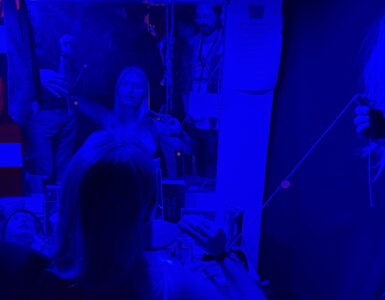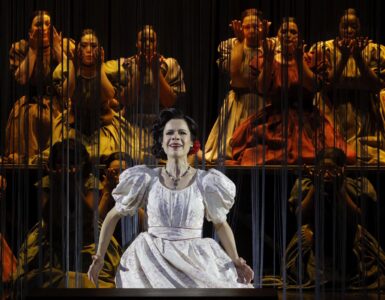The standard definition for the term “pathetic fallacy” is “the attribution of human feelings and responses to inanimate things or animals, especially in art or literature.” This is so common a thing that a term had to be coined to define it. Everyone has encountered this, from situations as slight as naming their car to the massive cultural influence of Disney animated films, which teem with wisecracking animals and crooning crockery. And then there’s the Belgian film Jumbo, in which a young woman falls deeply in romantic love with an amusement park ride. It’s inspired by a supposedly true story in which a woman married the Eiffel Tower, but the movie is very much its own unique creature. It’s not going to be for all tastes (it’s almost the very definition of an arthouse movie), but for those willing to take the ride, it’s a visually dazzling, emotionally moving film that has the courage of its quirky convictions.
Jeanne (Noémie Merlant) works as a night janitor in a local amusement park in her small town. The work, in which she is all alone in the empty park, suits her. She’s ill at ease with people, much preferring the company of the elaborate Erector set models of carnival rides in her bedroom. She still lives at home with her bartender mother, Margarette (Emmanuelle Bercot), who is trying to make Jeanne be more “normal” by pushing her toward dating the new park manager, Marc (Bastien Bouillon). One evening, while cleaning the light bulbs on a new ride at the park, the ride seems to respond to her by flashing its lights and making noises. Once she realizes that the ride (which she nicknames “Jumbo”) is actually communicating with her, she finds an emotional connection with it she’s never found before with anyone else. As Jeanne’s secret nighttime romance progresses, however, Margarette and Marc become aware and are determined to stop it.
Merlant is superb as Jeanne in what is practically a solo performance. She is alone onscreen interacting with inanimate objects for two-thirds of the film, and it’s still completely compelling viewing. Hers is an emotionally vivid, raw performance, convincing in both the details of her character’s remove from the world and in her joy of finding something she really cares about. In particular, in the scene in which Jeanne rides Jumbo for the first time, the expression of happy rapture on her face as the world spins behind her convinces the audience that this movie is indeed a love story.
Bercot is very good as Margarette, a woman who loves her daughter but who isn’t especially well-prepared to deal with her being such an outlier. It’s a fully three-dimensional portrayal of the character, contrasting her care for Jeanne with her own self-interest, and finally her overreaction and anger when she’s confronted with something she doesn’t understand. Bouillon is fine as Marc, but his role is somewhat thinly written, causing him to be more of a series of plot points than a credible character. Jumbo (whose actual name is “the Move It”, the ride being a wheel of seats lifted into the air by a mechanical arm and spun around) is thoroughly well-cast as the titular subject, and offers what surely is the best performance by a theme park ride in cinema history.
Writer/director Zoé Wittock deserves a great deal of credit for bringing such a tricky, unique story to the screen, and even more so for making it such a gloriously cinematic film. The fact that it’s her debut feature is even more impressive. It’s the concept and the realization of that concept that work best in Jumbo; the dialogue and some of the character plotting can be less effective. Lines such as “Inanimate objects, do you have a soul, which sticks to our soul and forces it to love?” seem a bit overblown and artificial, but this is a minor cavil. Wittock brilliantly uses all of the movie tools at her disposal; from Thomas Buelens’ gorgeous cinematography to Thomas Roussel’s orchestral score, from the power of her actors to the integral (if uncredited) sound design.
This film is all about the use of light and color, from the blazing, widening circle of blues and yellows in the striking opening sequence to the hellish wash of red in a scene in which Jumbo rears up as if suddenly demonic, black oil pouring all over the ground like blood. Jumbo’s appearance and the sounds it uses to communicate are so similar to the alien ships in Close Encounters of the Third Kind that it has to be an homage, and it’s a successful one. The specter of mental illness haunts the movie, and scenes in which Jeanne hides from the world by running to the whirling center of the moving ride or presses her naked body against Jumbo in broad daylight work well to encourage the audience to question if this story is a fairy tale or a breakdown.
There’s a surprising amount of nudity for a story that seems like it might just be an offbeat romance, but as with most romance, sex is an aspect of it. Whereas a scene like the one in which Jumbo raises Jeanne up to look at the starry sky is classically romantic, another scene in which Jeanne has a vision of being naked in an empty white space and gradually covered with oil is specifically erotic in intent. This openly sexual theme in the movie may be uncomfortable for some viewers, but it’s part and parcel of the somewhat transgressive story it’s telling.
Jumbo is a very well made and original film replete with stunning visual beauty. Hopefully it will find the appreciative audience of cinephiles that it very much deserves.
Now available to view on all VOD (video on demand) platforms.







